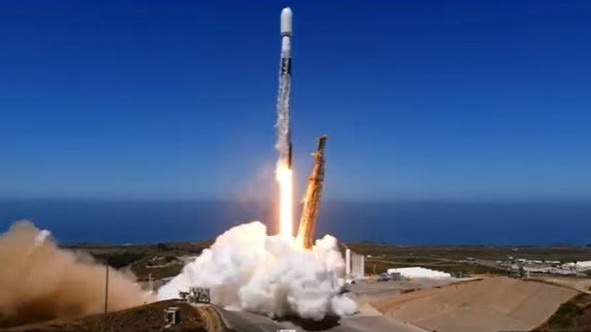SmartSat CRC chief executive Andy Koronios warns of missed opportunity in space
Australia will fall further behind in the global space race unless both major political parties put the industry back on the agenda, an industry leader warns.

Business
Don't miss out on the headlines from Business. Followed categories will be added to My News.
Australia is at risk of falling further behind in the global space race unless both major political parties put the industry firmly back on the agenda, space industry leader Andy Koronios has warned.
Space has hardly got a look in during the federal election campaign, which has been dominated by policies to tackle the cost of living, housing and energy crises, an under pressure health system and rising global economic and geopolitical uncertainty.
While acknowledging the importance of those immediate priorities, Prof Koronios – who heads up the SmartSat CRC based at Lot Fourteen – says it would be a missed opportunity to ignore the long-term economic and security benefits of a burgeoning domestic space industry.
“We can understand why government priorities change, particularly at the moment with the housing crisis, cost of living – these are real and present problems,” he said.
“But space is not just about exploration. We rely on satellites for our defence, for our border control, for our weather, for emergency management, the electricity grid, the next generation of food production and the next generation of mining – it touches just about everything we do.
“So it’s not just building the space industry, it’s actually underpinning all of that economy. Of course, the government needs to give support to young people to get a new home, to support people with cost of living, but at the same time it needs to balance that with investments in R&D that will grow the economy.”
Prof Koronios led the bid to create the SmartSat CRC in 2019, securing $55m in federal funding and $167m in cash and in-kind contributions from universities, space companies and government agencies, making it the country’s biggest space industry research centre.
It works alongside the Australian Space Agency to catapult Australia into the global space industry through research and development, and partnerships with emerging satellite companies like Fleet Space and Myriota.
Last year it partnered with Myriota and Inovor Technologies to launch South Australia’s first state-owned satellite – Kanyini – into space on-board a SpaceX rocket from Vandenberg Space Force Base in California.

The Space Agency launched in 2018 with the goal of tripling the size of the Australian space sector to $12bn and generating an additional 20,000 jobs by 2030. But after a series of funding cuts, including the scrapping of a $1.2bn satellites program in 2023, there are fears the industry is tracking well behind those targets.
Prof Koronios says the local development and deployment of nano-satellites can play a central role in developing a sovereign space industry, which would deliver long-term economic benefits as well as greater national security at a time of rising geopolitical tensions.
“In a world increasingly shaped by geopolitical instability, cyber threats, contested space domains and fragile supply chains, our dependence on foreign satellite infrastructure leaves us dangerously exposed,” he said.
“Every day, we rely on satellites for defence, weather forecasting, emergency management, agriculture, transport, communications, and national infrastructure yet we don’t own or control much of this capability.
“And with our vast maritime border, small population and large landmass, Australia has one of the most compelling cases globally for investing in sovereign space assets. Sovereign space capability is not a luxury, it is a strategic imperative.”
From a funding perspective, Prof Koronios says it isn’t about “throwing more money at the problem”, but rather being more strategic about government spending, and bridging the funding gap between research and venture capital.
“Our universities are doing a great job at inventing things, but there is a big chasm between the invention of technologies and scientific advances to actually making those commercial,” he said.
“What I’m talking about is investing in areas like how can we do better agriculture through the use of space assets? How can we manage disaster prevention, detection and response better with advances in Earth observation? That’s where the investment should be for a quicker return on investment by the government.”
Originally published as SmartSat CRC chief executive Andy Koronios warns of missed opportunity in space




